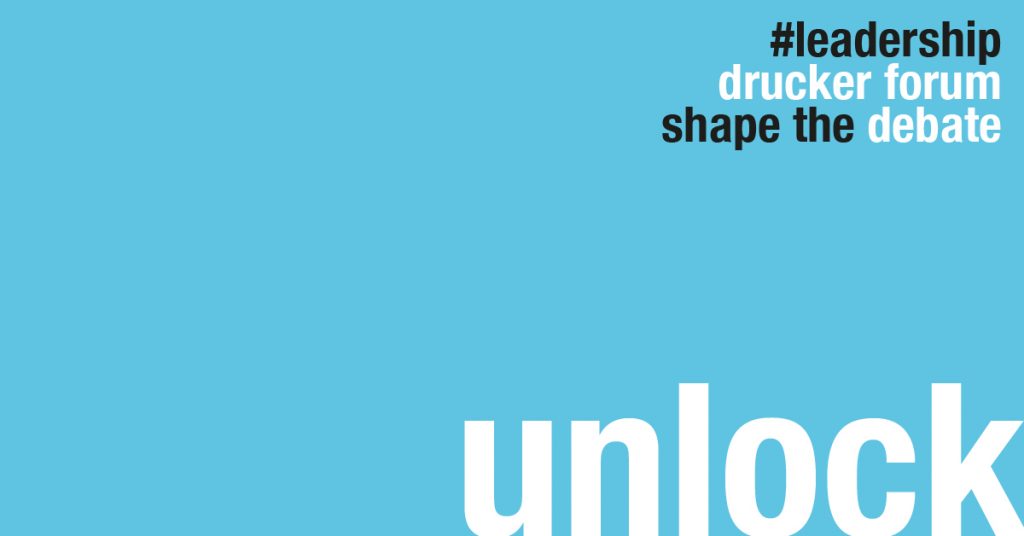
“The end of certainty means the possibility of novelty, of evolution.”
Ilya Prigogine
A critical function of leadership is to ask questions and not settle for answers. This protects uncertainty as a space for curiosity and imagination. When there are too many answers provided and too few questions asked, things stagnate and the atmosphere stifles. Protecting uncertainty is akin to keeping a window open for light and fresh air, maintaining a sense of opportunity and the ambiguity that keeps the spirit of humanity as a search for meaning.
We believe leaders inspiring others to superior performance works best when people pursue opportunities to innovate as a natural part of their daily work, when openness and playfulness become as valued as structure and reason. Yet we have found leaders struggle mightily with this simple premise. They have traditionally seen their role as shutting the window and eliminating all the mistakes. Here´s why!
Drucker Forum 2020
The Baggage of Uncertainty
There is a core idea that aggregated things have lower variability than individual components. For example, while individual air molecules behave chaotically, the air in a room can have a stable, ambient temperature as it takes on the aggregate behaviour of all molecules.
The notion of aggregation is central to insurance where the pooling of individual risks creates a more stable aggregate that can be priced. The same idea operates in financial markets where securitization pools debt obligations to create a synthetic reconfiguration into tranches sold to investors with different risk appetites.
In the same way, every innovation project has a large degree of uncertainty that cannot be eliminated: we cannot know all the outcomes of our actions, the consequences of those outcomes, and the meaning of those consequences. This represents an irreducible tension between doing and knowing. We need to know in order to do, but we also need to do in order to know.
Commitment serves as a mechanism for projecting certainty and clarity onto a project´s desired outcomes. Yet it comes with baggage, the humility of not knowing everything. All the uncertainty surrounding what could happen needs to be bagged up and set aside. The more we commit to one particular unfolding of events the heavier the bag containing the possibility of being wrong.
The Leader´s Role
When commitment and baggage move together, the baggage serves as a constant reminder of the need to focus on learning and to maintain the flexibility to change direction. No certainty is assumed. The illusion of certainty emerges only when the bag of uncertainty is hidden from view or otherwise detached. We argue that leaders must ensure the two always move together, for the future is often hidden in the bag.
However unintentionally, in many organizations the hierarchical relationships of accountability produce a separation between those facing uncertainty and those evaluating performance. Being accountable to someone is about being watched and judged, yet without them considering the uncertainty inherent in deciding what to do next. Practically, the uncertainty of outcomes sits on one side of time, while judgment and evaluation await on the other. Remember, action in the face of uncertainty is about doing before knowing. Judgment, on the other hand, is about knowing after doing.
Unhitched is organizational undoing
This is where something interesting happens in organizations: commitment and its counter-baggage of uncertainty get separated. Unhitched, the commitment slowly rises upwards, ultimately bringing a false sense of certainty to top management. In the meantime, the bag of uncertainty is left behind and settles on the shoulders of the middle managers or frontline staff. No matter how hard they try, they are left holding the bag. In short, as organizations pool frontline commitments they create synthetic certainty at the top at the expense of anxiety and stifled curiosity elsewhere.
Leadership facilitation
Over time, organizations accumulate all this baggage with pent up questions. Leadership is about slicing them open and facilitating meaningful discourse. The leader is a protector of uncertainty as intellectual humility and must be present anywhere innovation is taking place. Unlocking the potential of entrepreneurship is about replacing the quest for certainty with a quest for meaning.
About the Authors:
Joseph Pistrui is Adjunct Professor of Entrepreneurship & Innovation at IE Business School in Madrid, and co-founder of Kinetic Thinking.
Dimo Dimov is Professor of Entrepreneurship & Innovation at Bath University in the UK, and co-founder of Kinetic Thinking.
This article is one in the “shape the debate” series relating to the fully digital 12th Global Peter Drucker Forum, under the theme “Leadership Everywhere” on October 28, 29 & 30, 2020.
#DruckerForum

